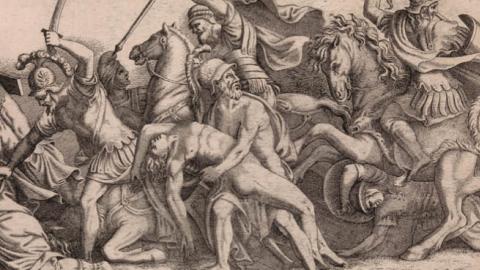The Oxford Student, the largest student newspaper of the nearly thousand-year-old teaching institution, reported in mid-February that the classics faculty has recommended that Homer’s Iliad and Virgil’s Aeneid be removed from the literae humaniores, an undergraduate program in ancient literature, history, and philosophy. The program has been criticized because of the difference in scores between male and female students, as well as because of differences in how much previous training its students have had in classical languages. This is an absurd standard. What will be taught if equality of grades between the sexes becomes the standard of choosing course material? The classics faculty would solve the grade-difference issue by shedding two of Western civilization’s core works.
A student studying classics at Oxford opposes removal of the two epic poems and is gathering signatures for a petition to end debate on their future at Oxford. Note that cutting off debate on difficult issues is not restricted to American universities.
The Oxford Student quotes the student’s objection to Homer-exit. It means, he says, that “Oxford would be producing Classicists who have never read Homer and never read Virgil, who are the central authors of the Classical tradition and most of Classical literature, in one way or another, looks back to Homer and interacts with the Iliad.”
It’s worse than that. Homer and Virgil are fundamental not only to classics majors or students who will eventually teach classics to other students. Homer, by himself, is the keystone of Western literature.
The Iliad is a story about human passions: anger, pity, remorse, compassion, revenge; men’s relations to forces greater than themselves; war and its horrors (and it is very horrible in Homer’s supremely elegant lines); and the beauty of art and nature. It is a complex and deeply insightful exploration of the soul, human fate, and immortality.
Its great heroes’ aspirations to dominance are the seeds of the idea of perfection that appears in the figures on Greek vases and in sculpture long after Homer died. The perfect human figure that the sculptor Praxiteles and other of his contemporaries sought to create eight centuries after Homer was both an echo of the poet’s imagination and a wellspring of the Renaissance.
Plato in The Republic criticizes the Iliad: Homer’s spirited heroes distract students from the philosophic spirit needed to reflect on the idea of justice. Thus did the same striving for the ideal find its way into ancient political theory, through which thinkers sought foundations for society in man’s distinctive and highest (read most perfect) attribute, reason. The pursuit of the ideal is with us today when we think about a perfect life, a more perfect world, a perfect mate — or “a more perfect union.”
Other civilizations, religions, and political systems aim at different ends: enlightenment, obedience, and harmony with nature, for example. There is much to be said in favor of these underlying principles. They bring inner peace, offer firm guidelines to life, and provide comfort amid life’s otherwise inexplicable vicissitudes. But those goals have not encouraged a society that constantly reflects on its values, advanced the cause of human liberty, developed an economic system that lifted millions out of poverty, or eradicated smallpox, to mention one accomplishment of Western medicine.
The effort of the Oxford classics faculty to remove Homer and Virgil could be dismissed as the doing of cranky dons, were it not part of the larger Western undertaking in which our past is seen in an increasingly dim light. An American president who apologized for his country’s past. History taught as a record of exploitation and oppression. Shakespeare removed from curricula for reasons of identity politics. The list is long and dreary. It is an indicator of a civilization that is losing its way.
Harold Macmillan is supposed to have quoted an Oxford don describing an educated person as someone who “will know when a person is talking rot.” By “rot,” Macmillan meant nonsense. The other meaning of rot is “decay.” That’s the activity the Oxford classics faculty members are engaging in as they seek to ban Homer.
Read in National Review



















